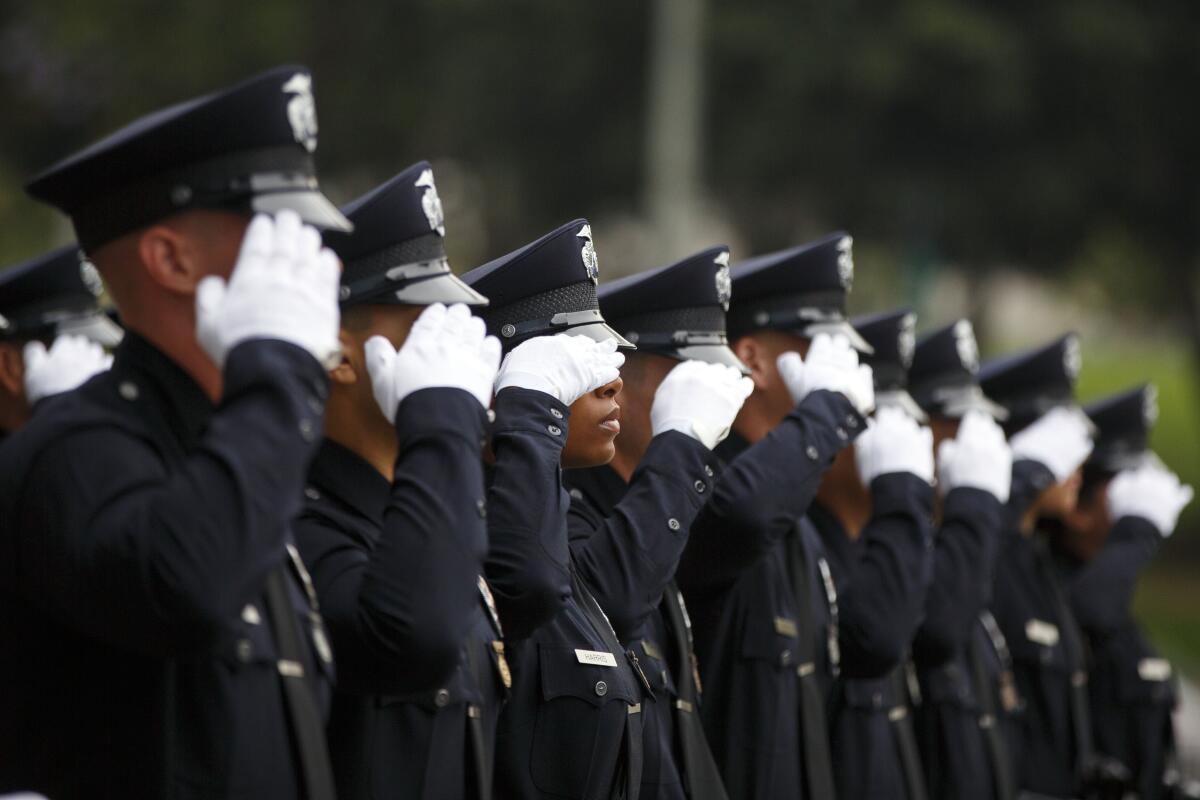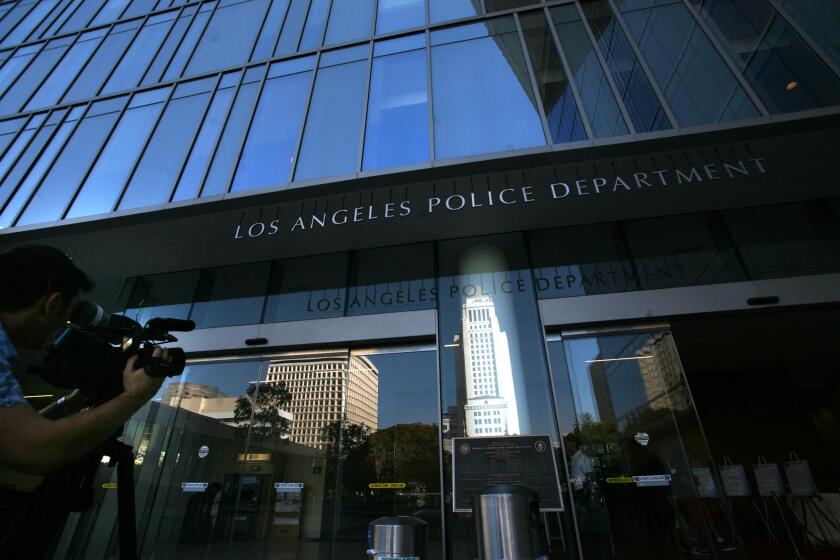New civilian discipline panels more lenient on accused LAPD officers, review finds

- Share via
A review of recent police misconduct cases by the Los Angeles Police Department’s inspector general found that hearing panels comprised entirely of civilians were more lenient on accused officers than more traditional panels with two officers and one civilian.
In the most serious cases, in which officers were recommended for termination by LAPD Chief Michel Moore, the all-civilian panels recommended a lesser penalty more than 70% of the time, the review found — leaving 11 officers on the force who otherwise would have been fired.
While based on a relatively small number of cases, the findings suggest that a 2019 ordinance allowing all-civilian Board of Rights panels for the first time has resulted — just as community activists feared — in lighter penalties for LAPD officers found to have violated department policies or committed more serious misconduct.
Presenting the report to the Police Commission on Tuesday, Inspector General Mark Smith said the pandemic had reduced the number of hearings in 2020, and he was “wary of drawing some really substantial or well-formed conclusions” from the limited findings.
However, he said the data still showed “notable trends” that department leaders should be mindful of as his office moves forward on a separate qualitative review of the Board of Rights process due later this year.
The Los Angeles City Council approved a measure Tuesday that gives civilians a greater role in how police officers are disciplined for serious misconduct.
The review assessed 47 Board of Rights hearings from June 2019 to December, including 26 all-civilian panels and 21 traditional panels.
It found that traditional panels were “substantially more likely” than all-civilian panels to uphold a recommended termination, all-civilian panels were “much more likely to recommend a lesser penalty.”
In cases in which Moore recommended a lesser penalty, traditional panels were more likely to recommend the same penalty, while all-civilian panels were more likely to recommend “less discipline or no discipline at all,” the report found.
Of the 26 all-civilian panels, 20 — or 77% — handed down a lesser penalty than had been recommended by Moore, with three handing down no penalty at all. Of the 21 traditional panels, 43% handed down a lesser penalty than recommended, with two handing down no penalty at all.
A traditional panel recommended a greater penalty than Moore in one case; all-civilian panels never did so.
Moore can reduce a panel’s punishment but cannot increase it. Officers can appeal a Board of Rights decision in state court.
Officers choose whether they receive an all-civilian or traditional panel. Few chose civilian panels in 2019, but in 2020, 22 of 31 officers who had hearings did so.
The traditional panels added a single civilian member in 1992 in the face of demands for reform after Rodney King’s beating and the subsequent unrest in L.A. Such hearings used to be public but were closed in 2006 based on city attorneys’ interpretation of a California Supreme Court ruling.
The City Council approved a measure creating the all-civilian panel option in April 2019, after voters approved a charter amendment allowing them to do so in 2017.
The change was backed by the police union and Mayor Eric Garcetti, who said members of the public should have a role in overseeing police, and opposed by activist groups, who said the civilians chosen for such panels would not represent the general public and that the change would likely result in less officer accountability.
The new report immediately revived those arguments.
A legal battle is brewing as the police union promises to block any review by the LAPD inspector general of officer disciplinary hearings.
Melanie Ochoa, director of police practices for the American Civil Liberties Union of Southern California, said “there was never any interest in ensuring that officers were held accountable in a fair process” among city or union officials who backed the all-civilian panels, which is why they excluded the community from picking panelists.
“They wanted officers to receive the least amount of punishment,” Ochoa said, and “we are already starting to see that that’s what’s happening.”
The Los Angeles Police Protective League’s board of directors said it believes “in the wisdom and judgment of Los Angeles residents to thoroughly and objectively evaluate the evidence presented to them” and that it was a shame that some would use the inspector general’s report to “disparage a police officer’s ability to get a fair shake from the residents we serve.”
Alex Comisar, a spokesman for Garcetti, said the mayor supports all-civilian panels because he believes “strong civilian oversight is critical to improving accountability and public trust in the police department.”
He said Garcetti also appreciated the inspector general’s report, “which will give the Commission and other stakeholders important information to decide how the process should work moving forward.”
Commissioner William Briggs said the report raised important questions.
“If the chief and his commanding staff have made a decision that an officer needs to be terminated, and that officer now knows that he can go to a Board of Rights composed of civilians and he has close to a 70 or even greater percentage chance of having that decision overturned ... then that undermines accountability and it also undermines the chief’s authority,” Briggs said.
Under requirements that were loosened with the creation of all-civilian panels, civilian panelists, who are paid, cannot have a criminal record or sustained allegations of misconduct against them, and cannot be a police officer.
They should “have a record of responsible community service,” and “at least two years’ experience in human resources, personnel relations, labor relations, or personnel matter related to recommending, administrating, adjudicating or reviewing the administration of discipline.”
In response to whether the current pool of panelists was sufficiently diverse, Richard Tefank, the commission’s executive director, said the commission had received many qualified candidates who represented the city well but that he would have to get back to the commission with a demographic breakdown.
More to Read
Sign up for Essential California
The most important California stories and recommendations in your inbox every morning.
You may occasionally receive promotional content from the Los Angeles Times.













